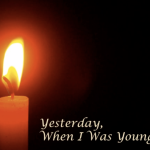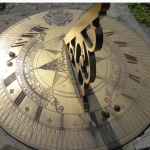
I was 16 when my friend and classmate Ben Braswell passed, and I remember standing near his grave at the funeral on a day when the winds really did come sweeping down the plains of Oklahoma.
Does time just really stop, or is our definition of time just really wrong?
I was feeling very sad and very confused. I was in shock and already missed Ben. And it was the first time I remember thinking seriously about the thing we call time, how it related to Ben and me, and I had no answers. Ben had been so young, full of life, and was so much fun to be around.
He was always looking ahead. And then, in one unguarded moment on the highway, he wasn’t. And that perplexed me.
A timely question
As the preacher was delivering the sermon (to Southern Baptist pastors, funerals are always a good time to deliver a sermon) I was thinking instead, “What should I make of Ben’s death?” Does time just really stop, or is our definition of time just really wrong?
I knew I wasn’t alone in my wonderings. To a teenager, life will go on forever. Time will go on forever. And when it doesn’t, as it didn’t for Ben, my friends and I asked,”What should we make of that?”
The stock answers (ie. “God needed him there more than we need him here”) may have worked for a short while, but they didn’t work long. I guess because Ben was my friend, I couldn’t let his passing go with such a quick fix.
On that particular November day, I did find myself wanting more of a reason that Ben’s time was cut so short. The whole life he had ahead of him had just evaporated, all because of one moment in time. Absent an answer or even a framework for finding one, I finally let it go.
And yet, since I’m still writing about it nearly 60 years later, I guess I didn’t.
Musical clues
That may be why songs that are about time have resonated with me over the years. There was Jim Croce’s Time in a Bottle, the Beatles’ Yesterday, Garrett Hedlund’s Timing is Everything, Green Day’s Good Riddance (aka Time of your Life), and Paul Anka’s The Times of Your Life (which became the theme song for Kodak commercials}. Even the Bergmans’ and Legrand’s Windmills of Your Mind deals with time and its riddles as it reflects, “… Like a clock whose hands are sweeping past the minutes of its face …”
The fact there have been so many songs on this theme underscores how much importance we all attach to time. We equate it with life, and we feel life will be somehow be better if it lasts a long, long time. We feel a person is cheated if he or she passes before reaching that moving-target age where it seems okay to die.
A few songs have spoken to me, and the lyrics have helped lead me toward a peaceful cease-fire (if not a resolution itself) with my angst over the nature of time.
Time for young and old
A French songwriter, Charles Aznavour and his lyricist Herbert Kretzmer captured the young person’s vague idea of time in the song, Yesterday, When I was Young.  That link takes you to it, and its phrases like, “I teased at life as if it were a foolish game, the way the evening breeze may tease a candle flame.”
That link takes you to it, and its phrases like, “I teased at life as if it were a foolish game, the way the evening breeze may tease a candle flame.”
As I was singing and recording this song a few weeks ago, I realized that’s exactly what I (and probably Ben) did when we were young. We did not take threats to life and time seriously until, one day, we realized we should have. After all, if the concluding lyrics to Aznavour’s haunting song are true, “…the time has come for me to pay for yesterday, when I was young.”
Still, knowing this doesn’t really answer the question of how time should be regarded, or if there is a one-size-fits-all definition. Certainly the young among us view it differently than the old. Songwriter Joni Mitchell said as much in her song, The Circle Game, back in the 60s. Tracing the life of a young boy as he turned older, Mitchell reminded us that the young want time to speed up (“words like, ‘when you’re older,’ must appease him”) but, as we grow older, the desire is to “drag your feet to slow the circles down.”
Time as a circle
Several songwriters have used the circle imagery when writing about time and its passing. Harry Chapin certainly did it when he came right out and named his song, Circle.
Right from the start, Chapin sings, “All my life’s a circle…” Then he adds another another element that most of us have wondered about when it comes to time: “It seems like I’ve been here before; I can’t remember when; But I have this funny feeling, that we’ll all be together again”
The thing about circles, of course, is they don’t end. They just keep on going.
Johnny Cash, Waylon Jennings, Kris Kristofferson, and Willie Nelson (aka The Highwaymen), picked up on that circular element to the end of time, with their song, Highwayman. Each takes a whack at the concept of unbounded, circular time with his own verse. Cash wraps it up by musing he may become a highwayman again, “… or I may simply be a single drop of rain …. but I will remain, and I’ll be back again and again and again.”
Then, of course, there’s Elton John’s The Circle of Life. That link takes you to a spine-tingling interpretation of it by Alex Boye’, with a few backup singers known as the Mormon Tabernacle Choir. Sir Elton’s thoughts on time and life are on display with lyrics like, “it moves us all to despair, hope, faith, and love … till we find our place on this path unwinding, in the circle, the circle of life.”
Focusing the lens
When children are perplexed by reality, their parents will often counsel them that they will understand when they’re older. That’s been true about many things in my life, but not so much about understanding what to make of time. As an adult, I have continued to wonder: Should I fight for more of it, and feel sad for those who have dismounted Joni Mitchell’s “painted ponies”? Or should I believe the departed have just entered another phase of time with its own colorful carousel?
At times, I think of what Harry Chapin wrote: “No straight lines make up my life, and all my roads have bends; There’s no clearcut beginning, and so far no dead-ends.”
So, if that’s true here, might it not be true where Ben Braswell is, too?
As a friend once noted in a spontaneous utterance the moment my father-in-law passed: “His last breath here is his first breath there.”
I am a writer, college professor, and author of several nonfiction books, including three on the decade of the 1960s. Several wonderful essays of gifted Retrospect authors appear in my book, "Daily Life in the 1960s."



Thanx for your beautiful and thoughtful story Jim, and sorry for your 60 year loss. It seems we can hold on to some memories but time robs us of others.
“Son, can you play me a memory,
I’m not really sure how it goes.
But it’s sad and it’s sweet, and I knew it complete,
When I wore a younger man’s clothes”
BILLY JOEL
.
Thank you, Dana. Not really sure it said what I started out to say, but writing freestyle takes you to different corners — or should I say windmills — of your mind.
Son, can you play me a melody
(damn spell-check)
A beautiful musing on time as it relates to our lives and how the musician/poets describe it through the music of our times – as circles, or windmills of the mind, or trapped in bottle. But nothing can prepare us for the loss of a close friend at a young age. We ask why, but there are no good answers.
I was a youngster when our neighborhood lost a 16 year old friend of my brother’s in a car accident. His older brother, a med student, happened to witness it, not realizing it was his baby brother, and ran to the scene to offer help, compounding the tragedy. I was 11 years old and went with my family to the shiva and to offer my condolences. I will never forget the grief I felt from the family that evening, some 68 years ago, how the mother hugged me close to her. We cannot make sense of it. We can only try to live our lives the best we can.
Thank you, Betsy. You’re right: losing someone you care about at such a young age is something you never forget. You just hope they are in a good place.
A wonderful story with lines, circles, and sounds, Jim. I have been doing a lot of meditation during the pandemic, and one of the guides online emphasizes that for Buddhists, time isn’t linear, but can be simultaneous. A lot of wisdom there.
Thank you, Marian. I think we’ve all been doing our fair share of meditating through the pandemic, and I appreciate your comment about the possibility of non-linear time. In western cultures, we learn time as a linear concept where things have a beginning, a middle, and an ending, all of which leads us to a conclusion about things. But one of my favorite films is from 1982 and is called, “The Year of Living Dangerously,” wherein western journalist Guy Hamilton is thrust into 1960s Jakarta. Here, he learns a new frame of thinking from his Chinese/Australian cameraman, Billy Kwan. In one scene just after they meet, Billy tells the kinetic Guy, “In the West, you want answers for everything. But in the Wayang, no such final conclusions exist.” Billy has been in Indonesia for a long time, and the Wayang is key to their thinking. It is the Javanese shadow play that focuses on the morality and mythology of life. And one of those myths is linear thinking.
Thank you for sharing this thoughtful and poignant meditation on time and its meaning at different stages of our lives. The death of someone young like your friend Ben is hard to accept. He should have had much more time. As we get older, we don’t feel cheated in the same way. We have had plenty of time, but it never feels like enough. I love the circle imagery and am especially fond of The Circle Game.
Thank you, Laurie. I like The Circle Game, too. I think I’ve been singing it since I was in my 20s, which is about as far as Joni takes the boy in the song. So, each decade, I push his age in that last verse a little further down the line. And now, it’s a LOT further down the line.
Sorry to hear of your loss, Jim. At that age, death usually comes unexpectedly as a shock and a mystery. I can feel that cold Oklahoma wind on my back. This prompt just keeps giving. I loved your choice of music on the topic and time as a circle brings me back to tempo.
Charles Mingus described time/tempo as a circle with the center of the beat at top dead center (to borrow a phrase from auto mechanics and ignition timing). You could play ahead of TDC (the way a bass player is often asked to do) or play on the descent to 90 degrees, etc. I find it to be useful and profound when playing in ensembles. And lord help the drummer who drags the beat. Peace.
Thank you, Charles. As one who plays solo most of the time and plays mostly by ear, your insightful comment on ensemble dynamics makes me fear of changing those modes. My wife, a classically trained performing musician, tells me I have an innate sense of timing, beat, and tempo, all of which works okay when I play alone. But I’d be the one throwing the others in the ensemble off-course, I’m afraid. I’ll know it a few weeks when I perform with such a group.
Jim, I love your analysis of all the different songs that talk about time. That’s usually my bailiwick, but I’m happy to share it with you. “Windmills of Your Mind” started playing in my head as soon as I saw your title, and then I started thinking about The Thomas Crown Affair, one of my favorite movies (the original, not the remake). Lots of free association opportunities in your story, so thanks for that. Also, sorry about the death of your friend Ben!
Hi Suzy. I didn’t know that’s where this piece was headed when I started writing it, but it seemed to be a good way to approach it. I’ll have to scroll through some of your former submissions to see the dots you connect between songs and prompts! My wife Anne is a fluid artist, wherein acryclic paints flow to create unique designs and colorations. She says she never knows exactly what her work will look like either when she starts. I always thought the same was true with Jackson Pollack’s work, too, although his work was more slinging than flowing.
My stories don’t necessarily connect any dots between the songs and the prompts, but of the 262 stories I have written so far, all but about 10 have song titles for their titles, and the title relates in some way to the topic. Generally I let the reader connect the dots, but sometimes I give an explanation.
Suzy, there is so much truth in music and it is expressed so beautifully.
Another song in the circle genre is Peter, Paul and Mary “The Great Mandala” (take your place on the great mandala, as it moves through your brief moment of time). I’m sorry you lost your friend, but you have not forgotten, and so his memory lives.
That’s right, Khati. I forgot about The Great Mandella. I love the PPM album it’s on.
Brilliant to see music as a touchstone for our experience of time!
Sixteen is so young to experience such a loss. I remained untouched by death for my first eighteen years. Then, in a span of less than eight months, I lost two close friends (one to drowning, one to homicide).
My favorite version of The Circle Game remains Tom Rush’s!
Dave, Thank you! I’ll have to check out that version. I had forgotten about Rush and it will be good to rediscover him.